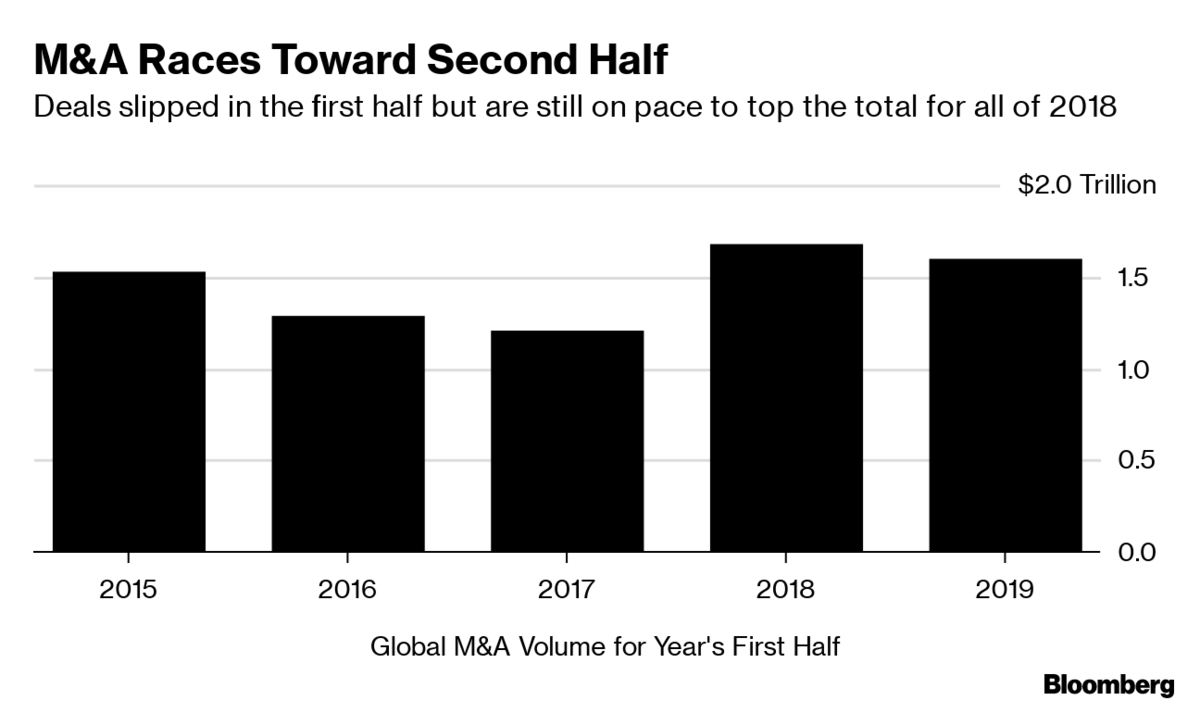
Anti-globalist sentiment is making it harder than ever to get deals done, even as low interest rates, technological disruption and waning organic growth drive mergers and acquisitions toward the best year since 2015, dealmakers say.
With 13,243 deals announced with a total value of $1.6 trillion, the first half of 2019 through this week is slightly behind last year, as Europe and Asia lag the U.S., according to data compiled by Bloomberg. The number of deals is down 9%, compared with 14,518 transactions totaling $1.7 trillion during the first half of 2018, the data showed.
Still, if this year’s pace continues, 2019 will be the best year since the value of global deals hit $3.34 trillion in 2015.
“M&A activity is being held back by regulatory complexity and uncertainty,” said Robert Kindler, global head of mergers and acquisitions at Morgan Stanley. “We have an administration that has a heightened focus on foreign investment and the national security implications of deals and that’s caused other countries to reciprocate. It’s fair to say it’s far more challenging than before.”
Antitrust reviews have also become more difficult to predict. T-Mobile U.S. Inc. and Sprint Corp., for example, are still awaiting the U.S. Justice Department’s decision on the $26.5 billion merger they announced in April 2018. Even if they secure federal approval, the mobile phone carriers face a lawsuit by 13 states and the District of Columbia to block the deal.
Nationalization, Globalization
“The cross-currents of nationalization versus globalization and trade, combined with the difficult-to-predict nature of antitrust enforcement in the U.S., definitely make it a difficult regulatory environment to navigate,” said Navid Mahmoodzadegan, co-president of Moelis & Co.
“The combination of deals getting blocked and held up has a chilling effect on other deals that we don’t read about because they never happen,” he said.
Still, Mahmoodzadegan is positive on the outlook for the rest of the year because “the level of active dialogue and desire for corporates to interact and transact has not changed.”
He expects technology, media and telecommunications, health care and industrials to be among the most active sectors in the second half of the year. Led by Salesforce.com Inc.’s $15.3 billion all-stock purchase of Tableau Software Inc. in June, dealmaking in the technology sector is up 20% to $126 billion, while industrials surged 60% to $195 billion, the data show.
Pfizer, AbbVie
In health care, overall activity was up more than 5% to $303 billion, the data show. Two deals announced this month -- Pfizer Inc.’s $10.6 billion play for cancer drug maker Array BioPharma Inc. and AbbVie Inc.’s $63 billion bid for Allergan Plc. -- highlight companies’ efforts to either buy new blockbuster drugs or shore up pipelines by diversifying.
Buying successful drugs doesn’t come cheap. Pfizer’s offer for Array represented a premium of more than 60% -- one example of why valuation is becoming a challenge for health-care executives eyeing transactions.
“What is challenging for most of my large cap clients is that the premiums being requested by biotech boards have been extremely high and quite a lot of deals are averaging more than 100% premiums,” said Elizabeth Mily, chairman of global life sciences at Barclays Plc.
“Those are really hard to swallow for public companies and boards and that means people are having to refine their views of where they really see value. Buyers are having to be more patient and be willing to say no.”
To contact the reporter on this story: Nabila Ahmed in New York at nahmed54@bloomberg.net
To contact the editors responsible for this story: Liana Baker at lbaker75@bloomberg.net, Michael Hytha
©2019 Bloomberg L.P.







